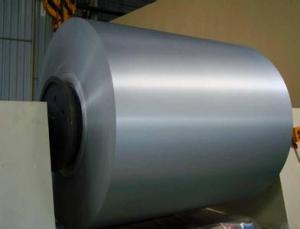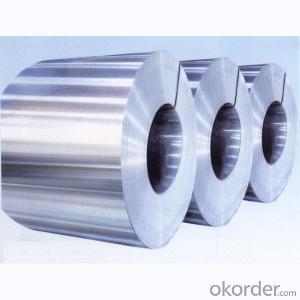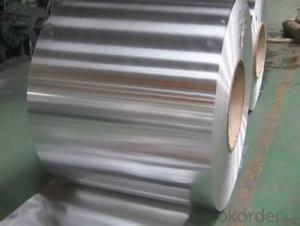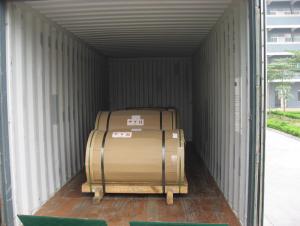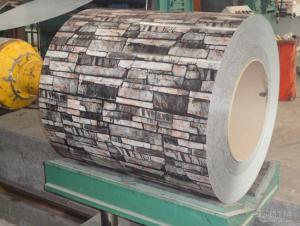Color Coated Aluminum Coil Custom 1xxx for Construction
- Loading Port:
- China main port
- Payment Terms:
- TT or LC
- Min Order Qty:
- 5 g/ft
- Supply Capability:
- 100000 g/ft/month
OKorder Service Pledge
OKorder Financial Service
You Might Also Like
1.Structure of Aluminum Mill Finished Coils 1XXX Used in Construction Description
Aluminum Mill Finished Coils 1XXX Used in Construction has great ductility, heat conductivity, anti-corrosion and moisture resistance properties.
Aluminum Mill Finished Coils 1XXX Used in Construction is widely used for PP cap stock, hot rolled thick plate, PS base plate, aluminum curtain wall base plate, the traffic sign ,air-conditioner heat and exchangers, food container, household foil, pharmaceutical packing, cigarettes packing.
2.Main Features of Aluminum Mill Finished Coils 1XXX Used in Construction
• Superior quality of raw material
• Reasonable and stable chemical composition
• Accurate tolerance
• Goode mechanical property
3.Aluminum Mill Finished Coils 1XXX Used in Construction Images
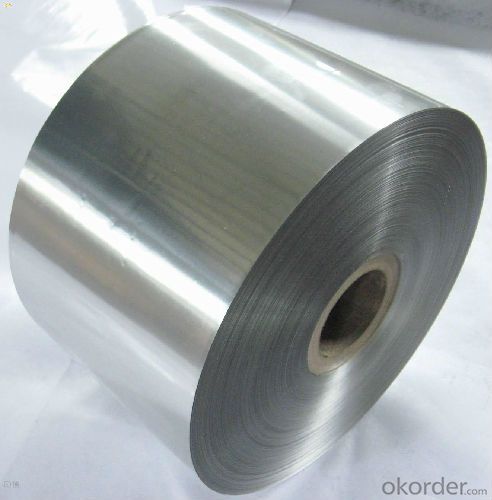
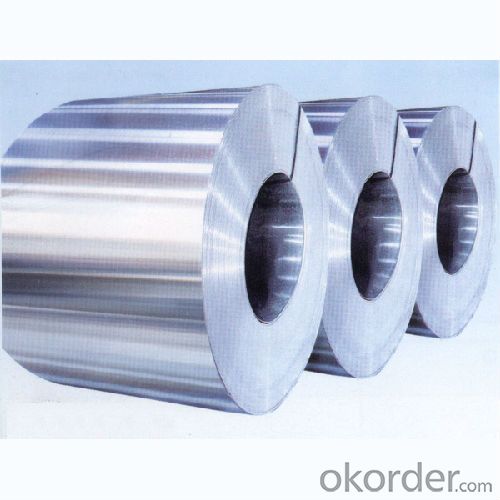
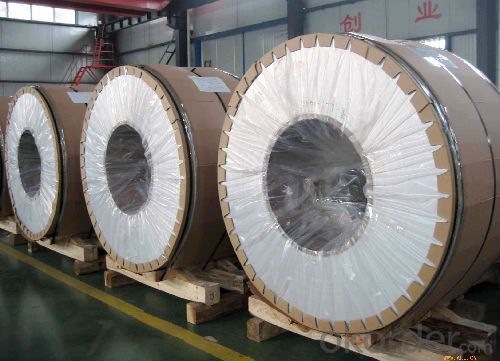
4.Aluminum Mill Finished Coils 1XXX Used in Construction Specification
Alloy | AA1xxx (AA1050, AA1060, AA1070, AA1100 etc. |
Temper | H14, H16, H18, H22, H24, H26, H32, O/F |
Thickness | 0.2mm -- 100mm |
Width | 30mm -- 1700mm |
Standard | GB/T 3880-2006,EN,ASTM,JIS |
5. FAQ of Aluminum Mill Finished Coils 1XXX Used in Construction
A.When will you deliver the products?
The Aluminum Mill Finished Coils 1XXX Used in Construction will be delivered within 35 days after receiving advanced payment or original L/C.
B. Now which countries do you export your goods?
Now we export to South East Asia,Africa, North America,South America ect.
- Q: Are aluminum coils suitable for architectural applications?
- Aluminum coils are indeed suitable for architectural purposes. The construction industry often relies on aluminum, a highly adaptable and long-lasting material, for a variety of architectural projects. The use of aluminum coils offers numerous benefits in this field, including their light weight, resistance to corrosion, and ease of shaping into desired forms and sizes. These coils find application in roofing, cladding, facades, gutters, and more architectural areas. Moreover, architects and designers have the option to coat aluminum coils with different finishes, providing a wide array of aesthetic possibilities. In conclusion, choosing aluminum coils for architectural projects is an excellent decision due to their robustness, endurance, and flexibility.
- Q: Are aluminum coils resistant to oil and grease?
- Yes, aluminum coils are generally resistant to oil and grease.
- Q: hello I'm building a TIG welder and have found the output from my stick welders to be not so good for aluminum(60 Hz on one). I've heard that high frequency AC is the way to do AL but am not sure what constitutes high. I do have a nice miller gas driven welder also that is maybe triple the frequency of my line driven one but still had issues with it. does anyone know of an actual # ? I may be able to build an inverting PWM supply eventually to do this but am not sure what I would need it to do. does anyone have any data that might help? any data/tips about aluminum would be appreciated, thanks in advance. FYI I do understand why AC works so much better on AL, what with the oxides that are always present.
- Best not to play around with jury-rigged equipment if you don't have to. The best option would be to simply buy a purpose-made Inverter power source for TIG. The high frequency is secondary to the main AC power, which is by default, 60 hz. In other words, the high frequency is simply added on top of the main AC current. A lot of inverter power supplies for TIG allow you to alter the MAIN power AC frequency to above or below 60 hz. This can be helpful as increasing the frequency produces a somewhat narrower arc. The high frequency is little more than highly amplified radio noise that is injected into the main power signal. It consists of a broad range of frequencies, usually in the range of kilohertz to megahertz. Beneficial features to look for in an inverter include high-frequency generator, square wave, AC wave balance, AC frequency adjustment, high frequency intensity adjustment, and a foot control. Pre-flow and post-flow controls can also be convenient if you expect to be doing mass production jobs. I consider other features, including pulsed TIG, to be mostly a waste of time and money. With respect to the previous poster, the high frequency DOES help with the cleaning action for welding aluminum.
- Q: What are the thermal expansion properties of aluminum coils?
- The thermal expansion properties of aluminum coils refer to how the dimensions of the coils change with variations in temperature. Aluminum is known for its relatively high coefficient of thermal expansion, meaning it expands and contracts more significantly compared to other materials when subjected to temperature changes. The coefficient of thermal expansion for aluminum is approximately 22.2 x 10^-6 per degree Celsius. This means that for every degree increase in temperature, the length, width, and thickness of the aluminum coils will increase by approximately 22.2 parts per million. Conversely, when the temperature decreases, the coils will contract accordingly. These thermal expansion properties have important implications in various applications where aluminum coils are used. For example, in heating and cooling systems, the expansion and contraction of aluminum coils due to temperature changes need to be carefully considered to ensure proper functioning and prevent damage. Similarly, in construction, where aluminum coils are often used for roofing and cladding, understanding their thermal expansion properties is crucial for avoiding structural issues and maintaining the integrity of the building. It is important to note that the coefficient of thermal expansion may vary slightly depending on the specific alloy of aluminum used in the coils. Additionally, other factors such as the thickness and shape of the coils can also influence the thermal expansion behavior. Therefore, when working with aluminum coils, it is advisable to consult the material specifications or consult with experts to accurately determine the thermal expansion properties and account for them in the design and application processes.
- Q: What are the different types of aluminum alloy used in coil production?
- There are several different types of aluminum alloy used in coil production, each with its own unique properties and characteristics. Some of the most commonly used aluminum alloys in coil production include: 1. 1100 Aluminum Alloy: This type of alloy is known for its excellent corrosion resistance and high thermal and electrical conductivity. It is often used in applications where strength is not a primary concern, such as in food and beverage packaging. 2. 3003 Aluminum Alloy: This alloy is commonly used in coil production due to its moderate strength and good formability. It is often used in roofing and siding applications, as well as in the manufacture of HVAC components. 3. 5052 Aluminum Alloy: This alloy is known for its high strength and excellent corrosion resistance, making it ideal for use in marine and automotive applications. It also has good formability and is often used in the production of fuel tanks and body panels. 4. 6061 Aluminum Alloy: This alloy is a versatile and widely used aluminum alloy that offers a good balance of strength, formability, and corrosion resistance. It is commonly used in a variety of applications, including structural components, automotive parts, and aerospace components. 5. 7075 Aluminum Alloy: This alloy is known for its high strength-to-weight ratio and excellent fatigue resistance. It is often used in applications where strength and durability are critical, such as in the aerospace industry. These are just a few examples of the different types of aluminum alloys used in coil production. Each alloy has its own unique properties that make it suitable for specific applications, and manufacturers choose the appropriate alloy based on the desired characteristics of the final product.
- Q: Can aluminum coils be used in high-vibration environments?
- Yes, aluminum coils can be used in high-vibration environments. Aluminum is known for its high strength-to-weight ratio, which allows it to withstand vibrations without significantly deforming or breaking. Additionally, aluminum has excellent corrosion resistance properties, making it suitable for various environmental conditions. It is commonly used in industries such as automotive, aerospace, and electronics, where high-vibration environments are prevalent. However, it is important to ensure that the aluminum coils are properly designed and installed to minimize any potential issues arising from vibration.
- Q: Can aluminum coils be used in kitchen appliances?
- Kitchen appliances can indeed utilize aluminum coils. Due to its remarkable thermal conductivity and resistance to corrosion, aluminum is extensively employed in the production of kitchen appliances. It finds frequent application in refrigerators, air conditioners, and other devices that necessitate efficient heat transfer. Lightweight and enduring, aluminum coils effectively disperse heat, rendering them ideal for a wide array of kitchen appliances.
- Q: How do aluminum coils contribute to the aesthetics of a building?
- Aluminum coils contribute to the aesthetics of a building by offering a sleek and modern appearance. The coils can be used for cladding, roofing, and other exterior applications, providing a clean and contemporary look. Their smooth surface and various color options allow for versatile design possibilities, enhancing the overall visual appeal of the building. Additionally, aluminum coils are lightweight and durable, making them an attractive choice for architects and designers seeking both aesthetic appeal and functional performance.
- Q: What are the electrical conductivity properties of aluminum coils?
- Aluminum coils exhibit excellent electrical conductivity properties. Aluminum is a highly conductive metal, ranking second only to copper in terms of electrical conductivity. The conductivity of aluminum is approximately 61% of copper's conductivity. This makes aluminum coils a popular choice for electrical applications where high conductivity is required. The electrical conductivity of aluminum is attributed to its atomic structure. Aluminum atoms have a relatively high number of free electrons, which are responsible for the flow of electric current. These free electrons can easily move through the lattice structure of aluminum, resulting in efficient electrical conduction. Furthermore, aluminum possesses low resistance, allowing for minimal energy loss during the transmission of electricity. This makes aluminum coils a cost-effective option for electrical wiring, power transmission lines, and other applications that require efficient electrical conductivity. It is worth noting that aluminum's electrical conductivity decreases slightly with increasing temperature. However, this decrease is relatively small compared to other metals, making aluminum coils a reliable choice for applications that involve high temperatures. In summary, aluminum coils possess excellent electrical conductivity properties, making them suitable for a wide range of electrical applications. Their high conductivity, low resistance, and cost-effectiveness contribute to their widespread use in various industries.
- Q: Does anyone know of any men's deodorant that doesn't contain aluminum? It has to be strong, as I do sweat a lot.
- Neways - works really well. Only thing is, you need a local distributor. But ring the company, I am sure it will help you.
Send your message to us
Color Coated Aluminum Coil Custom 1xxx for Construction
- Loading Port:
- China main port
- Payment Terms:
- TT or LC
- Min Order Qty:
- 5 g/ft
- Supply Capability:
- 100000 g/ft/month
OKorder Service Pledge
OKorder Financial Service
Similar products
Hot products
Hot Searches
Related keywords
